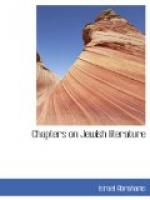For a long time after the death of Maimonides, which took place in 1204, Jewish thought found in the “Guide” a strong attraction or a violent repulsion. Commentaries on the Moreh, or “Guide,” multiplied apace. Among the most original of the philosophical successors of Maimonides there were few Jews but were greatly influenced by him. Even the famous author of “The Wars of the Lord,” Ralbag, Levi, the son of Gershon (Gersonides), who was born in 1288, and died in 1344, was more or less at the same stand-point as Maimonides. On the other hand, Chasdai Crescas, in his “Light of God,” written between 1405 and 1410, made a determined attack on Aristotle, and dealt a serious blow at Maimonides. Crescas’ work influenced the thought of Spinoza, who was also a close student of Maimonides. A pupil of Crescas, Joseph Albo (1380-1444) was likewise a critic of Maimonides. Albo’s treatise, “The Book of Principles” (Ikkarim), became a popular text-book. It was impossible that the reconciliation of Aristotle and Moses should continue to satisfy Jewish readers, when Aristotle had been dethroned from his position of dictator in European thought. But the “Guide” of Maimonides was a great achievement for its spirit more than for its contents. If it inevitably became obsolete as a system of theology, it permanently acted as an antidote to the mysticism which in the thirteenth century began to gain a hold on Judaism, and which, but for Maimonides, might have completely undermined the beliefs of the Synagogue. Maimonides remained the exemplar of reasoning faith long after his particular form of reasoning had become unacceptable to the faithful.
BIBLIOGRAPHY
MAIMONIDES.
Graetz.—III, 14.
Karpeles.—Jewish Literature and other Essays, p. 145.
Steinschneider.—Jewish Literature,
pp. 70, 82 seq.,
94 seq.
Schiller-Szinessy.—Encycl. Brit., Vol. XV, p. 295.
HIS WORKS:
Eight Chapters.—B. Spiers in
Threefold Cord (1893).
English translation in Hebrew Review,
Vols. I and II.
Strong Hand, selections translated by Soloweycik (London, 1863).
Letter to Jehuda Ibn Tibbon, translated by
H. Adler
(Miscellany of the Society of Hebrew
Literature, Vol. I).
Guide of the Perplexed, translated by M. Friedlaender (1885).
CRITICAL ESSAYS ON MAIMONIDES:
I.H. Weiss.—Study of the Talmud
in the Thirteenth Century,
J.Q.R., I, p. 290.
J. Owen.—J.Q.R., III, p. 203.
S. Schechter.—Studies in Judaism, p. 161 [197], etc.
On MAIMON (father of Maimonides), see L.M. Simmons,
Letter of
Consolation of Maimon ben Joseph,
J.Q.R., II, p. 62.
CRESCAS.
Graetz.—IV, pp. 146 [157], 191 [206].




